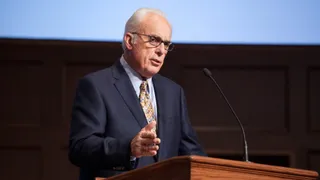I Got Invited to a Beth Moore Bible Study, Should I Go?

A few weeks ago, I was asked this question by a sincere member of our congregation. Her question was not vindictive or angry; she isn’t spending a lot of time on X trying to figure out which Christian celebrity to crucify next. She simply wanted to make sure that her limited time was spent studying the word of God from a trusted, reliable source.
At Clear Truth, our aim is to equip the everyday believer for everyday life. Everyday believers from across the country are gathering in homes, coffee shops, and churches with resources from all across the evangelical landscape. These resources are published by churches, independents, and the mega-evangelical conglomerates that control the narrative. Regardless of who is doing the publishing, or who is making the money, it is imperative that when believers gather to study that they do so with biblically-faithful resources.
Paul’s encouragement in Colossians 2:8 is helpful: “See to it that no one takes you captive by philosophy and empty deceit, according to human tradition, according to the elemental spirits of the world, and not according to Christ.”
In this verse, “No one” means anyone and everyone; including your favorite bible-teacher from years ago. Sadly, many heroes of the faith have gone astray. As I often say to my church, “you never go a little left.” Why not? Because once you open the door to progressive theology and diminish the authority, sufficiency, and inerrancy of Scripture you are opening the fence to wandering far off the field of acceptable orthodoxy.
Acceptable orthodoxy is a term that needs to be defined, but generally speaking it is a broadly evangelical doctrinal position that people across the denominational spectrum would sign off on. At our church, we invite speakers and use resources ranging from the conservative reformed to bible-believing charismatics. I don’t get too caught up in what resources our groups are using as long as they don’t fit into one of two categories: heresy or woke.
The former is obvious, no one wants heresy being taught in their church, the latter needs explaining. I don’t need to define woke, I even hate using the word now, but it fits. What has happened to many of the teachers and influencers over the past few years is that their “conservative theology” has led to absolutely horribly-woke conclusions.
At this point, the fruit (cultural application) is a better indicator of what someone actually believes than their stated doctrine.
So when asking whose resources should I use, one can’t just turn to the questions of the mid-2000s:
- “Who is the publisher?”
- “What network are they a part of?”
- “What denomination are they in?”
These questions used to work, they don’t anymore.
In today’s world, the better question is, “Have they publicly stood strong against the spirit of the age?” What’s the easiest way to discern this? Watch them, read their tweets, see who they associate with, and see what they champion.
A few examples:
- Did they bow the knee during covid and push the false narrative of “love your neighbor as yourself” as a biblical mandate to wear a mask, close down a church, and take the shot?
- Have they refused to take a clear position against homosexuality? (Remaining neutral or vague isn’t good enough in today’s world.)
- Have they confessed their whiteness and bought into the lies of critical theory? (For more on this check out conference speaker Voddie Baucham’s book Fault Lines).
- Did they advocate voting for a political party hell-bent on mutilating children and aborting babies?
- Have they jumped in with the empathy crowd crucifying male-headship and advancing “Christian feminism.”
These things, not a statement of faith, shows where a teacher's true heart lies.
Before saying yes to any bible study, do a little research and see how the content creator has responded to the questions above.
Sadly, this quick test may leave your list of potential study materials shorter than you desire. What do you do then?
- Read your Bible. It’s always good.
- Use older resources from the PW (pre-woke) era.
- Look around Clear Truth (and Canon+, Founders Ministries, Center for Baptist Leadership, Real Faith, and Theos U to name a few) and other reputable platforms and support faithful resources and content creators.
It is important today that Christians be asking these questions and that individual believers develop a framework to help them discern what content they should and should not be consuming. So let me ask you, after reading this, “Should you go to a Beth Moore bible study?”
P.S. The same thing has happened in the conference circuit. If you are looking for a good conference to attend, join us here.
Related Articles
Michael Clary | 7/23/2025
How To Speak Hard Truth In A Soft World
Harsh speech is not always sinful; gentle speech is not always righteous.
Geoff Kujawa | 7/17/2025
All My Christian Heroes Are Now Dead… Or Dead To Me
It seems like all of my Christian heroes are dead or woke!
Jon Harris | 7/15/2025
The Legacy of John MacArthur
The Legacy of John MacArthur: Virtue and Faithfulness
Lindsay Whitlow | 7/12/2025
An Open Letter to Chip and Joanna Gaines
But kindness is not kind at all if it’s telling a lie.
Vanessa Hunt | 7/11/2025
Toxic Town: Five Tactics of Prideful Leaders
Toxic! Five Tactics of Prideful Leaders
John Rosemond | 7/5/2025
A Good Life Begins With Britches That Fit!
As usual, the ENTIRE mental health professional community was WRONG about self-esteem!





